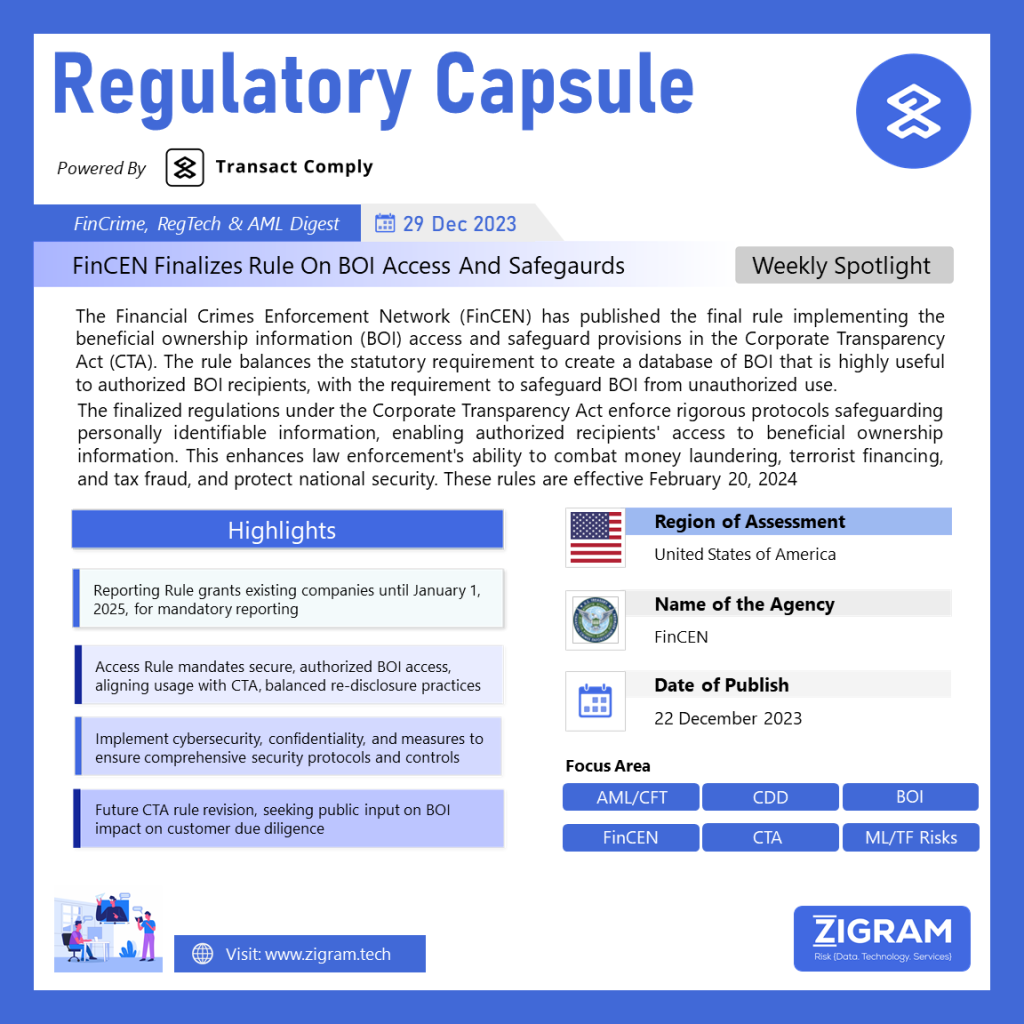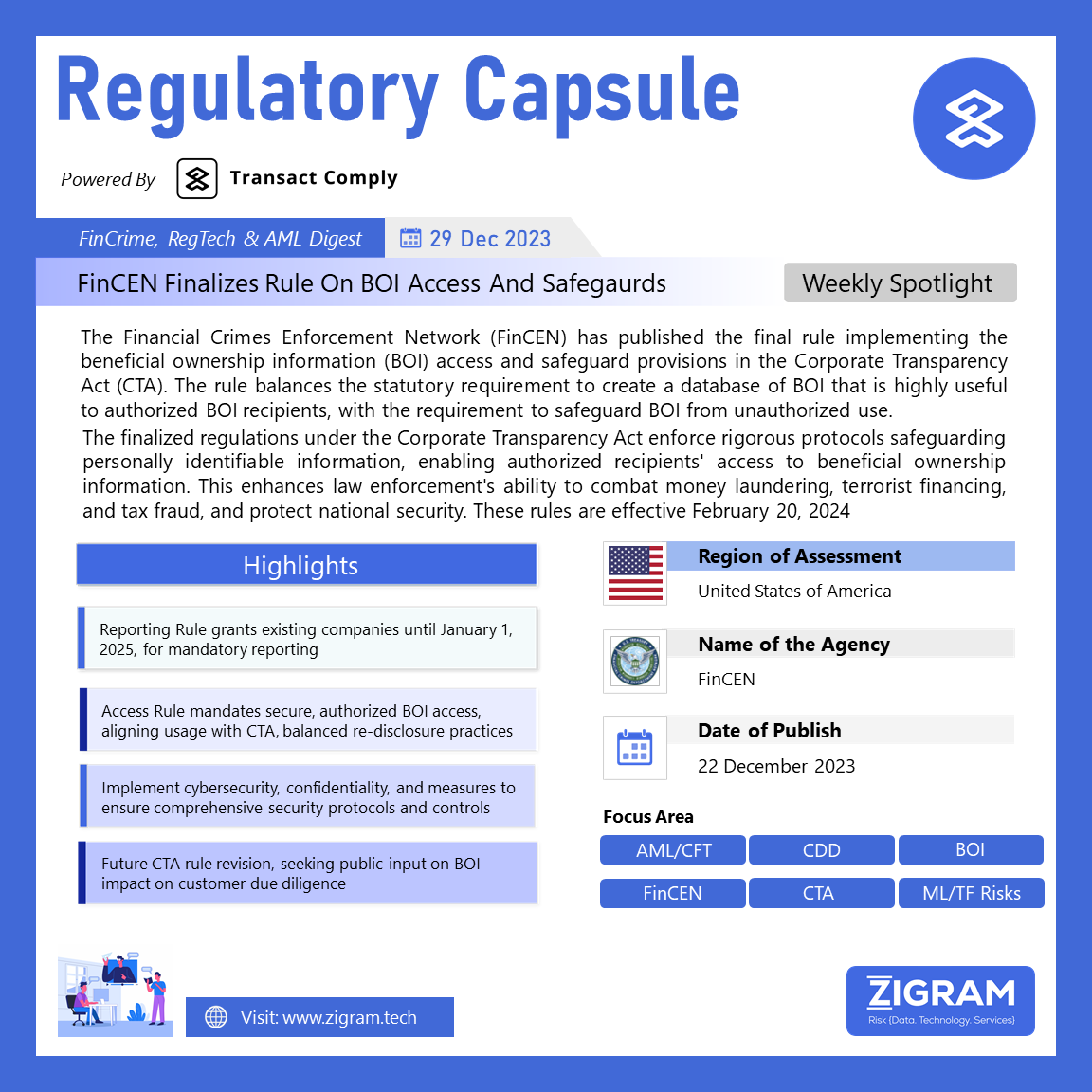Published Date:
The Financial Crimes Enforcement Network (FinCEN) has recently issued the final rule to operationalize the access and safeguard provisions of the Corporate Transparency Act (CTA), focusing on beneficial ownership information (BOI). This regulatory framework represents a delicate balance between the imperative to establish a comprehensive BOI database for authorized recipients and the necessity to safeguard this information from unauthorized use.
Enacted as part of the Anti-Money Laundering Act of 2020 within the National Defense Authorization Act for Fiscal Year 2021, the CTA mandates regulations governing access to BOI reported to FinCEN. The final rule emphasizes the critical role of BOI in combating various financial crimes, including money laundering, terrorist financing, and tax fraud, while simultaneously addressing concerns related to national security.
The Access Rule, as articulated by FinCEN, seeks to achieve three primary objectives. Firstly, it ensures that only authorized recipients have access to BOI. Secondly, it mandates that authorized recipients utilize this access solely for purposes sanctioned by the CTA. Lastly, it stipulates that authorized recipients only re-disclose BOI in a manner that aligns with the CTA’s objective of striking a balance between security and confidentiality while making BOI available for authorized purposes.
The regulations outlined in the Access Rule encompass a comprehensive framework designed to safeguard the integrity and confidentiality of BOI. This includes stringent cybersecurity controls, confidentiality protections, and restrictions on access and disclosure. Moreover, the rule establishes robust audit and oversight measures to ensure compliance with the prescribed protocols by authorized recipients.
FinCEN, acknowledging the paramount importance of security and confidentiality in handling sensitive information, demonstrates a commitment to upholding the highest standards. The agency emphasizes the need to instill confidence in the U.S. Government’s ability to protect such information while achieving the overarching goal of the CTA—establishing a highly useful BOI database to combat illicit financial activities and the misuse of shell and front companies.
The final rule also acknowledges public input received during the rulemaking process. This includes comments from advance notice of proposed rulemaking (ANPRM), a notice of proposed rulemaking (NPRM) regarding BOI reporting requirements, and another NPRM regarding BOI access and safeguards. FinCEN carefully considered this feedback in crafting the Access Rule, reflecting a collaborative approach to regulatory development.
In addition to the Access Rule, FinCEN outlines its commitment to implementing the CTA’s requirement to revise the 2016 Customer Due Diligence (CDD) Rule. This revision will be undertaken through a future rulemaking process, providing the public with an opportunity to comment on the impact of final BOI reporting and access rules on financial institutions’ customer due diligence obligations.
FinCEN’s final rule on BOI access and safeguards under the CTA represents a significant step towards enhancing the nation’s ability to combat financial crimes. By establishing a secure and controlled framework for accessing and disclosing BOI, the regulations strike a careful balance between the imperative for transparency and the need to protect sensitive information, contributing to the broader objectives of national security and the prevention of illicit financial activities.
- #FinCEN
- #BeneficialOwnership
- #CTA
- #AntiMoneyLaundering
- #AMLAct
- #NDAA
- #ReportingRequirements
- #BOI
- #FinCENIdentifier
- #RegulatoryUpdate


